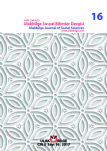REZİDÜEL İŞİTME ENGELLİLER İÇİN PİYANO EĞİTİMİ
PIANO EDUCATION FOR RESIDUAL HEARING LOSS PEOPLE
Author(s): Kutup Ata TuncerSubject(s): Music, Inclusive Education / Inclusion, Sociology of Art, Sociology of Education
Published by: Sanat ve Dil Araştırmaları Enstitüsü
Keywords: Hearing impairment; residual; piano;
Summary/Abstract: With the development of technology in the 2000s, many innovations have been revealed in the field of medicine, especially on the education and socialization of disabled people. For example, devices called artificial intelligence, which convert a neuro-sensor feature into a muscle movement practice, allow walking disabled individuals to walk with prosthetic devices or even participate in olympic games. Based on this, it is observed that there are sensorineural and moderate-to-severe hearing loss among residual (hearing) hearing impairments and it is observed that these education practices are inadequate especially in our country, considering the possibilities provided for individuals who want to receive music education. When we look at the examples in the world, it is understood that the applications are performed more in the form of music and rhythm therapy. From here, the development of music education practices that can be done in Turkey for the hearing impaired can be improved and the participation of hearing impaired people in this area can be increased. The structure of music based on mathematics and number system ensures that it is perceived as a visual art besides being a sensuous art. Ludwig van Beethoven is also known to have suffered hearing loss, but he has done many things. This shows that hearing is not an indispensable condition for music. For example, it is electronically designed and rhythm (beat-tempo) can be monitored horizontally; Digitally arranged notation (melody-harmony) can be provided to steal the instrument of the hearing impaired even in a simple case where it can be followed horizontally / vertically.
Journal: Ulakbilge Sosyal Bilimler Dergisi
- Issue Year: 5/2017
- Issue No: 16
- Page Range: 1693-1698
- Page Count: 6
- Language: Turkish

